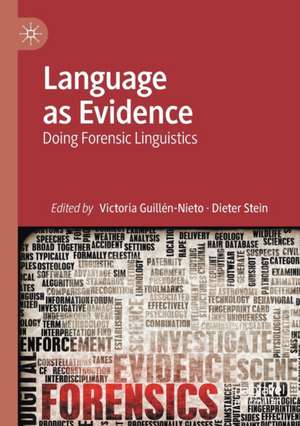Language as Evidence: Doing Forensic Linguistics
Editat de Victoria Guillén-Nieto, Dieter Steinen Limba Engleză Paperback – 10 feb 2023
| Toate formatele și edițiile | Preț | Express |
|---|---|---|
| Paperback (1) | 1006.13 lei 43-57 zile | |
| Springer International Publishing – 10 feb 2023 | 1006.13 lei 43-57 zile | |
| Hardback (1) | 1010.55 lei 43-57 zile | |
| Springer International Publishing – 10 feb 2022 | 1010.55 lei 43-57 zile |
Preț: 1006.13 lei
Preț vechi: 1226.99 lei
-18% Nou
Puncte Express: 1509
Preț estimativ în valută:
192.53€ • 201.52$ • 160.24£
192.53€ • 201.52$ • 160.24£
Carte tipărită la comandă
Livrare economică 31 martie-14 aprilie
Preluare comenzi: 021 569.72.76
Specificații
ISBN-13: 9783030843328
ISBN-10: 3030843327
Pagini: 464
Ilustrații: XVI, 464 p. 27 illus.
Dimensiuni: 148 x 210 mm
Greutate: 0.62 kg
Ediția:1st ed. 2022
Editura: Springer International Publishing
Colecția Palgrave Macmillan
Locul publicării:Cham, Switzerland
ISBN-10: 3030843327
Pagini: 464
Ilustrații: XVI, 464 p. 27 illus.
Dimensiuni: 148 x 210 mm
Greutate: 0.62 kg
Ediția:1st ed. 2022
Editura: Springer International Publishing
Colecția Palgrave Macmillan
Locul publicării:Cham, Switzerland
Cuprins
Introduction: Theory and practice in forensic linguistics: Victoria Guillén-Nieto & Dieter Alfred Stein.- Chapter 1. Serving science and serving justice: Ethical issues faced by forensic linguists in their role as expert witnesses: Janet Ainsworth.- Chapter 2. Linguistic expert evidence in the common law: Andrew Hammel.- Chapter 3. Expert evidence in civil law systems: Mercedes López Fernández.- Chapter 4. Interacting with the expert witness: Courtroom epistemics under a discourse analyst’s lens: Magdalena Szczyrbak.- Chapter 5. A lie or not a lie, that is the question. Trying to take arms against a sea of conceptual troubles: Methodological and theoretical issues in linguistic approaches to lie detection: Martina Nicklaus & Dieter Alfred Stein.- Chapter 6. Authorship identification: Eilika Fobbe.- Chapter 7. Automatic authorship investigation: Hans van Halteren.- Chapter 8. Speaker identification: Gea de Jong-Lendle.- Chapter 9. Plagiarism detection: Methodological approaches: Victoria Guillén-Nieto.- Chapter 10. The linguistic analysis of suicide notes: Monika Zaśko-Zielińska.- Chapter 11. Fighting Cybercrime through linguistic analysis: Patrizia Anesa.- Chapter 12. Linguistic approaches to the analysis of online terrorist threats: Julien Longhi.
Notă biografică
Victoria Guillén-Nieto is Senior Lecturer at the Department of English Studies, University of Alicante, Spain
Dieter Stein is Emeritus Professor at Anglistik III Englische Sprachwissenschaft, Heinrich-Heine-Universität Düsseldorf, Germany.
Dieter Stein is Emeritus Professor at Anglistik III Englische Sprachwissenschaft, Heinrich-Heine-Universität Düsseldorf, Germany.
Textul de pe ultima copertă
This edited book provides a comprehensive survey of the modern state of the art in forensic linguistics. Part I of the book focuses on the role of the linguist as an expert witness in common law and civil law jurisdictions, the relation of expert witnesses and lawyers, ethics standards, and courtroom interaction. Part II deals with some of the major areas of expertise of forensic linguistics as the scientific study of language as evidence, namely authorship identification, speaker identification, text authentication, deception and lie detection, plagiarism detection, and cyber language crimes. This book is intended to be used as a reference for academics, students and practitioners of Linguistics, Forensic Linguistics, Law, Criminology, and Forensic Psychology, among other disciplines.
Victoria Guillén-Nieto is Senior Lecturer at the Department of English Studies, University of Alicante, Spain
Dieter Stein is Emeritus Professor at Anglistik III Englische Sprachwissenschaft, Heinrich-Heine-Universität Düsseldorf, Germany.
Victoria Guillén-Nieto is Senior Lecturer at the Department of English Studies, University of Alicante, Spain
Dieter Stein is Emeritus Professor at Anglistik III Englische Sprachwissenschaft, Heinrich-Heine-Universität Düsseldorf, Germany.
Caracteristici
Provides the student and practitioner of forensic linguistics with an up-to-date view of the discipline Takes a non-dogmatic overview of the field that represents the most common approaches Crosses qualitative and quantitative boundaries to demonstrate what counts as a scientific procedure
